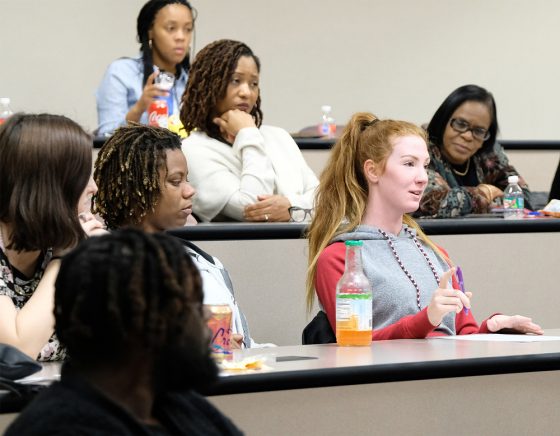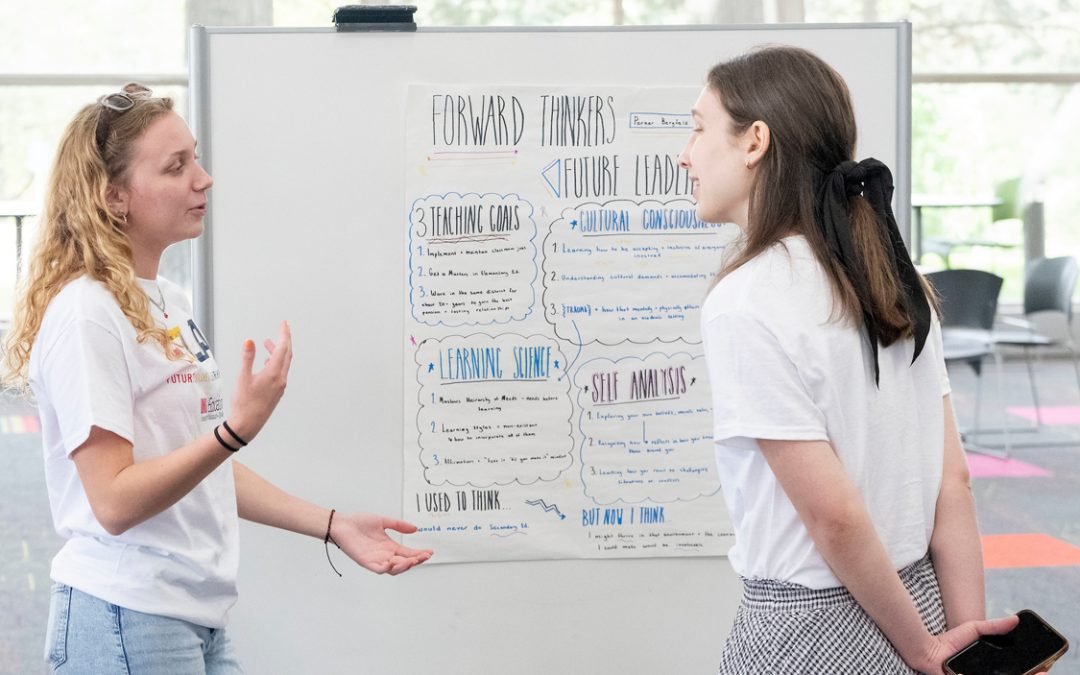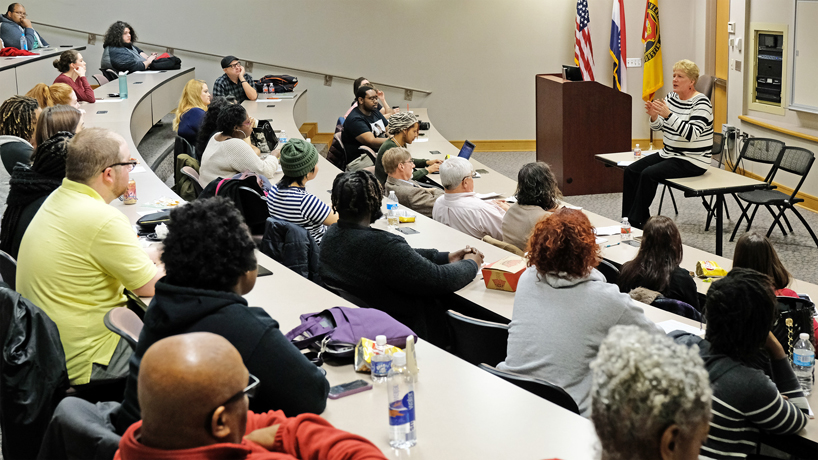
College of Education Professor Susan Kashubeck-West found herself surprised and encouraged by the high interest in the “Microaggressions: What Are They and Why Do They Matter?” discussion she led at last week’s What’s Current Wednesdays event. The discussion series is sponsored by The Current student newspaper and the New York Times, with support from Community Engagement and Outreach at UMSL. (Photos by August Jennewein)
When Susan Kashubeck-West asked a room full of University of Missouri–St. Louis students, faculty and staff for examples of microaggressions, hands shot up around the room.
An African American woman recalled being asked if she intended to brush her hair.
A queer student shared how a co-worker only thought to speak of queer topics with her.
A nursing student told the room about a patient who requested to speak instead with the doctor, having assumed the white man in the room was the doctor when actually he was a man whom the nurse was training.
Kashubeck-West, a professor in the College of Education’s counseling program, studies these subtle moments of discrimination that have become popularly known as microaggressions.
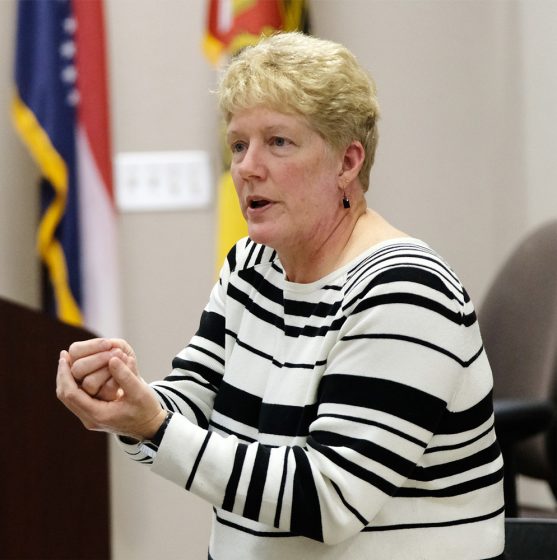
Susan Kashubeck-West stresses the importance of placing microaggressions in context and understanding how certain phrases and actions are received differently by different people.
“They are all the ways of communicating to a member of a marginalized group in our society that they are second class, inferior or less-than in some way,” she explained. “Examples often involve race, ethnicity, gender, sexual orientation, disability, social class and religion, to name a few.”
A recent article in the New York Times on how universities are training against this form of discrimination inspired last week’s campus discussion led by Kashubeck-West titled “Microaggressions: What Are They and Why Do They Matter?”
The event was the latest in the What’s Current Wednesdays discussion series sponsored by UMSL’s student newspaper The Current and the New York Times, with support from Community Outreach & Engagement at UMSL.
It served for a lively discussion.
The group devoted much time to determining what qualified as a microaggression.
“The boundary depends on who you ask,” Kashubeck-West said.
And that became clear in the room when she posed the hypothetical example of a person in a group asking the Asian man there, “Where are you from?”
Some perceived the question to convey the prejudiced notion of the Asian man as different and not one of the group.
Others read no preconception into the question but instead imagined the asker simply wanting to know where the man was from.
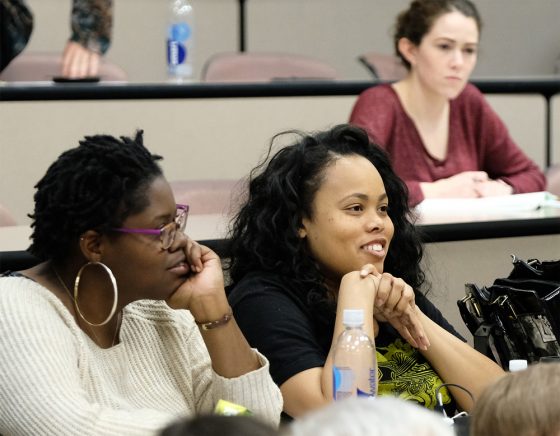
Student attendance was high for the discussion, where they openly shared their various experiences with microaggressions.
Those who perceived “where are you from” to be discriminatory suggested avoiding the phrase altogether, which others felt was over-regulation of language.
Kashubeck-West warned against such blanket bans but encouraged putting in effort not to offend.
“We shouldn’t automatically say, ‘You can’t say these words,’” she said. “What we need to do is recognize the way in which those things are not equally received or true for different people in our society.
“If you don’t belong to a stigmatized group, it’s harder to connect this one little thing that might get said to the group’s context,” she continued. “If you belong to a group that has suffered historical trauma or historical oppression, then that one little comment or joke is in a context that is very different than if you’re not a member of that group.”
But that didn’t keep the conversation from turning to questions of over-sensitivity and the thought that some should develop thicker skin – an idea that was not kindly received by many in the room.
“Who are you to say I am being overly sensitive?” one woman responded.
Many people agreed that the intent didn’t matter because hurt was caused and the microaggressor should work to correct his/her phrasing and behavior.
Kashubeck-West later responded in an email about the fairness of ascribing automatic guilt.
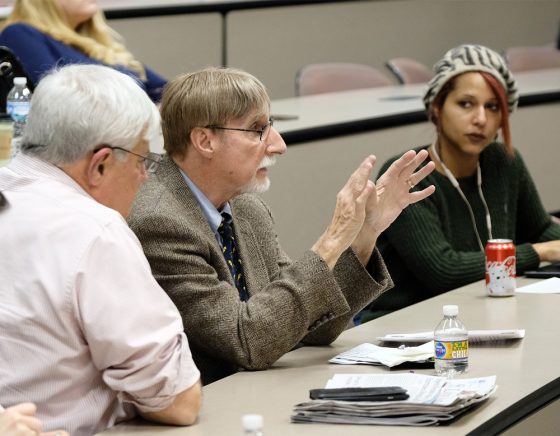
Faculty also had a healthy attendance. Here, political science Professor Marty Rochester asks if the recent guideline issued by the University of California to avoid the phrase “America is the land of opportunity” has gone too far in suggesting that the phrase is a microaggression in all contexts.
“This issue of being found guilty no matter what is complex,” she wrote. “The majority of time a person does a microaggression, there is no intent to be hurtful or insulting or demeaning, and that person is not aware of having done something offensive. And yet the things that are said may be perceived by most people in that marginalized group as offensive or insulting.
“There are situations where a person might be looking to find offense in everything that is said to them and may create mountains out of molehills. That doesn’t take away from the reality that many people are reasonably hurt by many microaggressions a day. Both are real.”
During the discussion, Kashubeck-West stressed that a lifetime of those little moments added together could contribute to serious negative outcomes for people of marginalized groups.
Research suggests that microaggressions contribute – but have not yet been proven to cause – psychological health problems such as low self-esteem, depression and anxiety. They also contribute to physical health problems associated with shorter life expectancy, including coronary heart disease, high blood pressure and high cholesterol.
“The more exposure, the more your body is in a stress-response mode, and that takes its toll,” Kashubeck-West said.
She also pointed out that some good, in the form of healthy coping strategies, can come out of experiencing chronic microaggression.
“But that doesn’t mean let’s engage in all sorts of stigma,” she added.
Kashubeck-West stressed that having productive conversations like Wednesday’s impassioned discussion is the key to growth. But that first requires people to come to the discussion with an open mind.
“If we walk in assuming that the conversation is going to be adversarial or that somebody is my enemy in some way, then it’s going to be difficult to have productive conversations,” she said. “The assumption should be that we’re not here to hurt other people but rather foster better relationships.”
She was also sure to point to the greater good of the event.
“When I walked in and found this big crowd, I find that very hopeful,” she said. “It’s great that there’s a lot of people who are interested in this topic who want to communicate across difference.”

